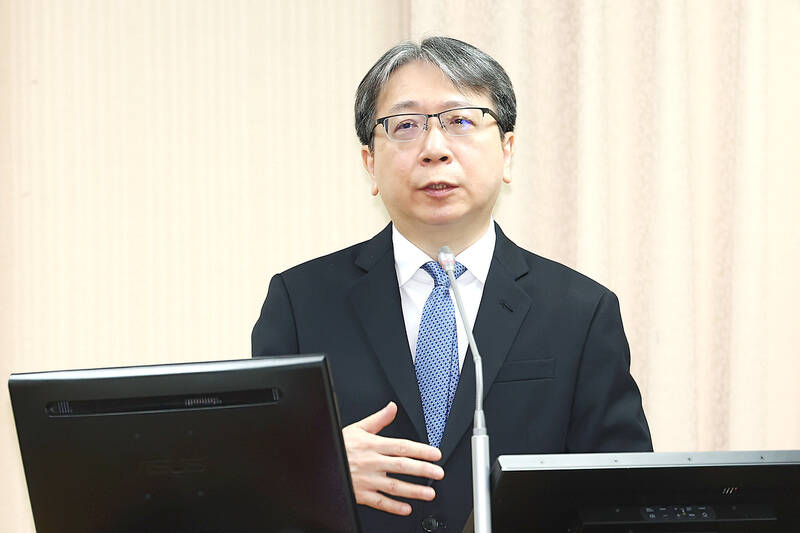China’s “united front” tactics targeting Taiwan’s outlying islands bear a resemblance to the Russian infiltration of Crimea before Moscow’s 2014 invasion of the territory, Taiwan’s top national security official said yesterday.
National Security Bureau (NSB) Director-General Tsai Ming-yen (蔡明彥) made the remark in response to questions from Democratic Progressive Party Legislator Lo Mei-ling (羅美玲) at the Legislative Yuan.
Lo drew parallels between Moscow’s justification of its 2022 invasion as “de-Nazifying” Ukraine and Chinese Nationalist Party Chairman Eric Chu’s (朱立倫) comparison of President William La (賴清德) to Adolf Hitler.

Photo: Wang Teng-yi, Taipei Times
Russian President Vladimir Putin and Chinese President Xi Jinping (習近平) had pledged cooperation in fighting neo-Nazism in their meeting earlier this month, she said, before asking if Beijing is shaping a narrative to legitimize an invasion of Taiwan.
Tsai said the bureau is studying Russia’s invasion of Ukraine to identify tactics Beijing might imitate in a military conflict with Taiwan.
Russia’s and Ukraine’s use of drones in the war is of particular interest to the bureau, he said.
The bureau is also observing whether Beijing would copy Russian political propaganda and cognitive warfare techniques, he added.
Describing Ukrainian President Volodymyr Zelenskiy as a Nazi leader has been a staple in Moscow’s political strategy to justify the war, Tsai said.
The NSB identified a push by Moscow to intensify the economic, cultural and ethnic integration of Ukraine and occupied Crimea shortly before the war, a tactic that resembled China’s strategy targeting Kinmen and Lienchiang (Matsu) counties, he said.
Regarding a rise in illegal border crossings by Chinese nationals, Tsai said investigators have not ruled out the possibility that some of the cases were part of Beijing-directed espionage.
An economic motive could explain other cases involving impoverished Chinese nationals, he said.

DAREDEVIL: Honnold said it had always been a dream of his to climb Taipei 101, while a Netflix producer said the skyscraper was ‘a real icon of this country’ US climber Alex Honnold yesterday took on Taiwan’s tallest building, becoming the first person to scale Taipei 101 without a rope, harness or safety net. Hundreds of spectators gathered at the base of the 101-story skyscraper to watch Honnold, 40, embark on his daredevil feat, which was also broadcast live on Netflix. Dressed in a red T-shirt and yellow custom-made climbing shoes, Honnold swiftly moved up the southeast face of the glass and steel building. At one point, he stepped onto a platform midway up to wave down at fans and onlookers who were taking photos. People watching from inside

A Vietnamese migrant worker yesterday won NT$12 million (US$379,627) on a Lunar New Year scratch card in Kaohsiung as part of Taiwan Lottery Co’s (台灣彩券) “NT$12 Million Grand Fortune” (1200萬大吉利) game. The man was the first top-prize winner of the new game launched on Jan. 6 to mark the Lunar New Year. Three Vietnamese migrant workers visited a Taiwan Lottery shop on Xinyue Street in Kaohsiung’s Gangshan District (崗山), a store representative said. The player bought multiple tickets and, after winning nothing, held the final lottery ticket in one hand and rubbed the store’s statue of the Maitreya Buddha’s belly with the other,

‘NATO-PLUS’: ‘Our strategic partners in the Indo-Pacific are facing increasing aggression by the Chinese Communist Party,’ US Representative Rob Wittman said The US House of Representatives on Monday released its version of the Consolidated Appropriations Act, which includes US$1.15 billion to support security cooperation with Taiwan. The omnibus act, covering US$1.2 trillion of spending, allocates US$1 billion for the Taiwan Security Cooperation Initiative, as well as US$150 million for the replacement of defense articles and reimbursement of defense services provided to Taiwan. The fund allocations were based on the US National Defense Authorization Act for fiscal 2026 that was passed by the US Congress last month and authorized up to US$1 billion to the US Defense Security Cooperation Agency in support of the

HIGH-TECH DEAL: Chipmakers that expand in the US would be able to import up to 2.5 times their new capacity with no extra tariffs during an approved construction period Taiwan aims to build a “democratic” high-tech supply chain with the US and form a strategic artificial intelligence (AI) partnership under the new tariffs deal it sealed with Washington last week, Taipei’s top negotiator in the talks said yesterday. US President Donald Trump has pushed Taiwan, a major producer of semiconductors which runs a large trade surplus with the US, to invest more in the US, specifically in chips that power AI. Under the terms of the long-negotiated deal, chipmakers such as Taiwan Semiconductor Manufacturing Co (TSMC, 台積電) that expand US production would incur a lower tariff on semiconductors or related manufacturing